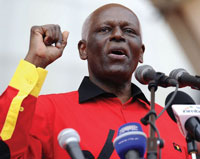>> Business Guide Africa > Business In Angola
Angola: L'étoile montante de l'Afrique
L'Angola est en train de devenir un pôle d'échanges et d'affaires dans la région de l'Afrique du Sud ...
Angola recently celebrated 10 years of peace after a devastating civil war, with parades and concerts hailing President Jose Eduardo dos Santos for ushering in an oil-fuelled economic boom. Dos Santos unveiled a peace monument in Luena, the capital of the eastern province of Moxico, near the site where Unita rebel leader Jonas Savimbi was killed in battle on February 22, 2002. The monument featured two giant dark hands releasing a white dove to the sky and is installed in the town’s Lenin Park, named after Russian communist leader, Vladimir Ilyich. Savimbi’s death paved the way to a peace deal signed in the capital Luanda on April 4, 2002, ending the 27-year civil conflict that erupted soon after independence from Portugal in 1975.
The conflict left an estimated 500,000 dead, displaced four million others, involved  three different liberation movements and saw intervention from the former Soviet Union, Cuba, the United States and apartheid South Africa. The immensity and duration of the conflict left much of the road, bridge and farming infrastructure destroyed.
three different liberation movements and saw intervention from the former Soviet Union, Cuba, the United States and apartheid South Africa. The immensity and duration of the conflict left much of the road, bridge and farming infrastructure destroyed.
How times have changed. Today Angola can now boast of a booming economy – forecast to grow 12 per cent this year – and a growing regional and international diplomatic profile.
Angola’s physical transformation since the end of the war has also been immense. Oil revenues and associated Chinese loans have bankrolled an ambitious national reconstruction programme of roads, airports, bridges, hospitals and schools.
In the sprawling cities, where the war-weary sought refuge during the height of the conflict, urban slums are being given a facelift.
And once productive agricultural fields are now being cleared of landmines ready for replanting; industries like cotton and coffee are being revived and old copper, iron and gold mines are being re-opened for prospection.
Meanwhile, foreign investors are flocking to Angola hoping to share in the boom times and Luanda’s tiny Fourth of February airport is overwhelmed by new flights coming from across Africa as well as Europe, Asia and the Middle East.
Today Angola is recognised as sub-Saharan Africa’s second largest oil producer behind Nigeria and as a world-class area for oil exploration and production.
Producing almost two million barrels of oil per day, Angola is the biggest supplier of oil to China and the sixth biggest to the United States. Oil accounts for about 90 per cent of Angola’s exports accounting for 40 per cent of GDP and 80 per cent of government revenues.
Angola’s rapid reconstruction after 30 years of civil war is literally changing the face of the nation. Evidence of this is the current presence of over 50,000 Chinese workers in the country.
China has been one of the main financiers of oil-rich Angola’s rapid development since the end of the civil war ended in 2002 and in exchange for loans and aid, estimated to total more than US$4 billion since 2004, China has been guaranteed a generous chunk of Angola’s future petroleum production. The accords also stipulate that 70 percent of the country’s development projects be given to Chinese companies, which prefer to import their own workers.
Chinese and Angolan economic and political ties expanded during the late 1980s,  with the signing of their first trade agreement in 1984 and the establishment of the Joint Economic and Trade Commission in 1988. Since then, bilateral trade increased steadily – bilateral trade exceeded US$120 billion in 2012 and Angola is currently China’s largest African trade partner.
with the signing of their first trade agreement in 1984 and the establishment of the Joint Economic and Trade Commission in 1988. Since then, bilateral trade increased steadily – bilateral trade exceeded US$120 billion in 2012 and Angola is currently China’s largest African trade partner.
Oil was first discovered in Angola in 1955, but production did not really start to climb until the discovery of oil offshore Cabinda in the 1960s. Now, many of Angola’s remaining offshore oil blocks are being auctioned to the world’s superpowers who are in need of the oil supplies.
The capital city of Angola, Luanda, recently snatched the title of “most expensive city” away from better-known capitals such as London, Oslo and Tokyo, according to a number of international surveys. The survey measured the cost of food, basic items including drinks and tobacco, and other costs such as clothing and electrical goods. A liter of imported milk is $5 and a can of locally produced Coke is $.90.
The tide of petrodollars surging into the once sleepy port has widened the gulf of disparity between the rich and the poor in the city and moreso in the whole country. More than three-quarters of Luanda’s residents, nearly four million people, live in the informal settlements, and these are grim. Most have no sanitation services; people must buy water from tanker trucks for nearly $1 a bucket. Infant and maternal mortality rates are some of the worst in the world. Many of the slums have no schools; when they do, they lack teachers, desks and books.
What has risen most significantly is the cost of real estate. For sale in a mediocre neighbourhood of Luanda: pokey two-bedroom apartment in a Soviet-style 1960s apartment block, fourteenth floor, elevator last operated in 1990, erratic plumbing, no maintenance in the past 22 years. Asking $300,000 (U.S.) And that’s about all you’re going to get in Luanda for $300,000: any new one-bedroom apartment in this city starts at $1-million.
In an attempt to diversify its economy, Angola launched a $5 billion sovereign wealth fund – a move more associated with wealthy Gulf States like Qatar and the UAE. The state-owned investment fund, known as the Fundo Soberano de Angola, will invest domestically and internationally, focusing on infrastructure development and the hospitality industry. These are two areas the Government of Angola believes is “likely to exhibit strong growth”.
 In an exclusive interview with CNN, Jose Filomeno de Sousa dos Santos, the son of Angola’s longtime president who is on the board of the fund, said “now is a very good time.”
In an exclusive interview with CNN, Jose Filomeno de Sousa dos Santos, the son of Angola’s longtime president who is on the board of the fund, said “now is a very good time.”
He added: “The country has had around five years of steady growth, good growth, mostly based on oil production increases, and it plans to diversify the economy. The best way to do that is to do that is to intervene directly in the economy through investments.”
Dos Santos says the aim of the fund is to invest profits accrued from oil to promote social development in the country.
“It is very easy to have oil money and spend it but it is very difficult to have a positive impact to improve people’s lives on a daily basis,” he said, “and that is an area we intend to invest on a lot with the sovereign wealth fund.”
The formation of a formalized fund was first announced by Angola’s President Jose Eduardo dos Santos. But the global financial crisis caused the oil price to plunge, hammering Angola’s economy.
The government had to offset the crisis by securing a loan from the International Monetary Fund (IMF) in the form of a Stand By Arrangement of around $1.4 billion.
With new deep water oil finds announced by the government, Angola hopes to outstrip Nigeria to become Africa’s largest oil producer. But the revenue from Angola’s black gold won’t last forever. The government hopes the sovereign wealth fund will help diversify Angola’s profits to secure its future.
-
 Arabian Jerusalem Company:
Arabian Jerusalem Company:
L'un des principaux fournisseurs de machines et de matériel de construction neufs et d'occasion. Les produits incluent des Grues, Jantes Chargeurs, Bulldozers, niveleuses, rouleaux compresseurs, Tractopelles JCB, Pelles, générateurs, compresseurs d'air, etc .. Bétonnières -
 Global Auto Parts:
Global Auto Parts:
Fournisseur de toute une gamme de pièces d'automobiles après-vente pour une grande variété de voitures. Recherche distributeurs et des agents en Afrique... -
 World Wide Auctioneers:
World Wide Auctioneers:
Auctioneers de machines neuves et d'occasion contruction, de machines industrielles, de transport et d'équipements lourds. World Wide Auctioneers est également l'agent pour Unic Grues et un nom de renommée mondiale dans le dépôt de machines et d'équipements lourds ... -
 Hollywood Style Cosmetics:
Hollywood Style Cosmetics:
Gamme complète de produits cosmétiques qui sont extrêmement populaires auprès des acheteurs africains. La société offre des promotions pour les clients africains et la recherche de distributeurs en Afrique... -
 Solite Batteries:
Solite Batteries:
Batteries Solite gagnent en popularité dans les marchés africains en raison de leur longue durée de vie et des prix compétitifs. Contactez directement les concessionnaires et économiser de l'argent
-
 Marchands de pneus à Dubaï
Marchands de pneus à Dubaï
Contactez-exportateurs à Dubaï spécialisée dans les pneus, les tubes et les batteries. Offres spéciales pour les acheteurs africains offerts... -
 Le marché des pneus en Afrique
Le marché des pneus en Afrique
Importateurs en Afrique sont à la recherche de nouvelles sources d'approvisionnement pour répondre à la demande croissante de pneus dans les marchés africains ... -
 Trouver des partenaires commerciaux en Afrique
Trouver des partenaires commerciaux en Afrique
Lignes directrices sur la façon de trouver des partenaires commerciaux, des agents, des distributeurs sur les marchés africains... -
 Répertoire des entreprises Nigeria
Répertoire des entreprises Nigeria
Télécharger le Répertoire des entreprises Nigeria en format Excel. Liste des entreprises au Nigeria sous différentes catégories commerciales...
-
Stay up to date

- Abonnez-vous au flux RSS






Exportateurs à Dubaï Fournir à l'Afrique